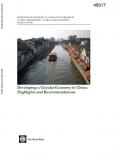Northeast Asia Carbon Markets and Trade Connections published by Asia Society Policy Institute (ASPI) in collaboration with ICTSD focuses on carbon pricing and the linking of carbon pricing systems as a potential catalyst for increased trade relationships, and explores how the benefits from linking can be heavily impacted by trade relationships and competitiveness concerns within the economies of China, Japan, and Korea.
The report introduces the different approaches to carbon pricing and linking currently being used by the three countries, explains the benefits and challenges of linking different carbon pricing systems, and proposes ways to deepen integration of carbon pricing and trade policies to promote regional carbon market linkage as well as increase trade between all three countries.

Informal economic activities across much of sub-Saharan Africa provide crucial cash income and employment for both rural and urban populations. Governing the informal economy is recognised as a key policy challenge due to its contribution to local livelihoods and its common association with illegality, tax evasion and negative environmental impacts. In addition, because of the increasingly globalised trade in commodities, parts of the informal economy can also be supported by global sources of capital. This ‘globalised’ rural informal economy urgently calls for innovative policies, which maximise the benefits of global capital flowing directly to rural populations, while minimising the negative impacts associated with the environment, revenue losses and resource governance.
